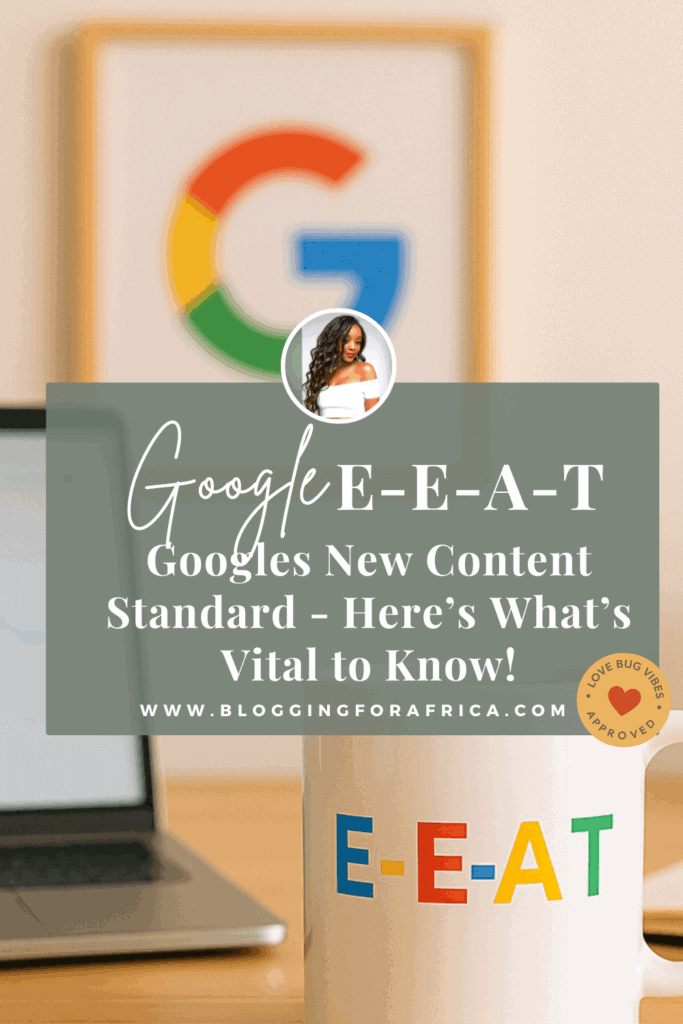E-E-A-T Update July 2025: Google’s New Content Standard
July 14, 2025

E-E-A-T Update July 2025: Google’s New Content Standard – Explained
Hello love bug! It’s that time again — and today, we’re diving into one of the biggest updates Google has rolled out in 2025.
This July, Google officially rolled out a major E-E-A-T Update — and trust me, this isn’t just another acronym to brush off.
This is how Google is now evaluating websites (and blogs, aka content-driven websites) to decide:
- If your site gets placed on the first page…
- Or buried somewhere on page 12 (yikes, Google don’t play).
And honestly, it hurts my heart to know how many businesses are about to see their numbers drop and have no idea why.
Unknowingly, in many cases, some site owners hopped on trends way too fast without realizing how strict Google was about to get.
We’ll talk more about that in a separate post soon, but for right now, we’ll keep it simple —
So, grab your coffee, here’s what well break down in this post
- What E-E-A-T actually stands for and why Google created it
- Google’s ultimate goal with this update (and why it matters for your site)
- Who this update will affect most
- A quick look at how this version compares to the old E-E-A-T standards
- And finally — why, as a real creator passionate about your topic, you should be excited about this change
What is E-E-A-T (And Why Does It Matter in 2025?)
E-E-A-T stands for Experience, Expertise, Authoritativeness, and Trustworthiness.
While Google has always prioritized helpful content, this update raises the bar.
Now, it’s not enough to simply sound credible.
Google is literally cross-referencing every angle of your site — and even information about your brand across the internet.
Why? To decide if your website, your business, and the content you’re putting out are real.
Think of it like this: you’ve seen that MTV show Catfish, right? Well, Google’s basically doing the same thing — figuring out which websites are genuine and which are not.
Just to give you a gist of what Google is trying to avoid:
Close your eyes and imagine this — you search Google for health tips, beauty tips, travel ideas, or even financial advice.
Instead of real experts and creators showing up, the top 10 results are full of AI-generated websites —
Or worse, run by someone who does have the experience but is letting AI generate all of their content for them instead
Stuffed with copy-and-paste blog posts written by software that has no actual experience in the topic How would that make you feel? Exactly.
Because you expect Google to show you the most credible information, not fake and or generic content.
That’s why this update is so strict — Google is weeding out generic websites and content to make sure users get the real thing.
But if you’re the real deal — meaning you’re authentic, passionate about your topic, and you genuinely care about serving your audience — good news.
You just need to make sure your site is positioned to show it.

📌 Love this breakdown? Save it for later! Pin this post — “E-E-A-T Update July 2025: Google’s New Content Standard Explained” — to your blogging or business tips board on Pinterest so you can revisit it anytime!
1. Experience
By “experience,” one of the first things Google is going to look at when it comes to your website and blog posts is whether you have first-hand experience.
They want to know:
- If the websites sharing personal stories or real-life examples
- When sharing techniques have they tested it on themselves, their clients, or in their daily life
- Or is the website giving generic copy and paste tips from Google
Example: If you’re a hair care blogger, Google will look at if the post let’s say “Top 10 Hair Care Tips” covers generic tips or personal lived feedback from yourself, clients ect.
And remember — Google isn’t just looking at one post. They’re reviewing your entire site for consistency.
- If your blog posts feel authentic but the rest of your website looks generic or copy-paste, that’s a red flag.
- If your main pages are written authentically but your blog posts are stuffed with generic, AI-like content, that’s also a red flag.
Bottom line: the full picture matters.
2. Expertise
Now, before you panic and think, “But I’ve only been running my business for two years — am I even an expert?” — let me stop you right there.
When Google says “expert,” they’re not saying you need 10 years in your field or a PhD. They’re asking:
- Do you have real-world knowledge or training in what you’re talking about?
- Do you show that through your posts, examples, or background info?
Here’s the thing: More often than not, you’re already more of an expert than you give yourself credit for.
- Maybe you just started your online business, but you’ve been working offline in that field for years.
- Maybe you went to school for it or learned hands-on through personal experience.
Even if you’re brand new to creating a content-driven website, you’re still considered an expert if you’re sharing real, tested experience — not just recycling other people’s tips.
This update isn’t about having a “perfect” resume; it’s about proving you’re credible in the knowledge you already have and making sure that credibility shows up clearly on your website and in your blog content.
3. Authoritativeness
When it comes to authoritativeness, think of it like applying for a job.
You list your experience on your resume, but what else does a company often ask for? References.
That’s exactly how Google approaches authoritativeness. Think of it as Google taking other credible sources’ word for how credible you are.
- If other reputable websites link back to your content, that’s like someone saying, “Yes, this person knows what they’re talking about.”
- You don’t need 100 links to look credible — even a few high-quality mentions from trusted sources can tilt things in your favor over time.
4. Trustworthiness
Here’s where the entirety of your website plays a role. Google wants to know they can trust your site, not just your content.
They look for things like:
- A secure website (HTTPS and SSL certificate)
- Clear author or business information (who you are, what you do, your background or credentials)
- Transparent policies (privacy policy, disclaimers, content or copyright policies)
Their bots crawl all of this to piece together the full picture of whether your site feels trustworthy.
Google’s Ultimate Goal With This Update
Google’s goal is simple: protect the quality of search results.
They want the top-ranking content to be helpful, accurate, and user-friendly because when users trust Google, they keep coming back.
This is their way of saying, “Enough is enough — only real, helpful websites and content get priority.”
Who This Update Will Affect Most
- AI copy-paste sites: They’ll feel it first, especially full AI-generated websites where everything (site structure, taglines, About pages) is copy-paste.
- Businesses ignoring their blogs: If your site has no content or treats its blog as an afterthought, you’ll likely be outranked by content-driven websites giving Google a full picture of expertise.
Good news: If you’re purpose-driven and actually care about your audience, this update is designed to benefit you.
Why You Should Be Excited 🎉
If you’ve been putting in the work, sharing real insights, and genuinely serving your audience — or you plan to — this update will work for you perfectly!
Because Google is rewarding content with heart, real stories, and actual value 👑
So keep blogging with passion. Sharing your expertise and lessons, and make sure your site reflects who you are and why your brand and business are credible so that you get the credit.
And if you’re not sure how to position your site to align with these standards, I’ve got you covered.
I’ll be breaking down:
- E-E-A-T for Bloggers (aka Content-Driven Websites)
- E-E-A-T for Businesses
- The Dangers of Relying Soley on AI Under These New Standards
Those posts are coming soon, so stay tuned.
Quick Note on AI Software (and Why You Should NOT Stress About It)
Now, before we wrap up, let’s clear up a huge misconception: Google does NOT use AI-detection software to figure out if your content was written by AI.
Why? Because those tools are wildly inaccurate. Google has even said directly that it doesn’t rely on them — and honestly, thank goodness for that.
Those AI detectors flag great writers all the time simply because their tone is clear, structured, and professional.
I’ll be honest — I tested one of my own freestyle blog drafts in an AI detector once, and it flagged me as 90% AI.
Crazy, right? And to be even more honest, I was actually offended.
Just imagine pouring hours into a blog posts you wrote yourself, only for some tool to say, “Nope, this doesn’t seem human.”
So if you’ve been worried about Google penalizing you just because a random AI checker said your writing “sounds like AI,” don’t be.
Google evaluates based on E-E-A-T signals — not on whether some tool thinks you write too well to be human.
Google’s official statement on AI content
Final Thoughts
The E-E-A-T update isn’t here to scare you — it’s here to reward creators who care.
If you’re sharing real stories, genuine expertise, and valuable content, you’re already on the right track.
Keep blogging with purpose, keep your site authentic, and over time, Google will notice.
All right, love bug — enjoyed this post about the E-E-A-T update and ready to keep learning? Here are a few other posts you’ll love:

📌 E-E-A-T Update July 2025: Google’s New Content Standard Explained — pin this to your blogging tips or SEO strategy board so you can revisit anytime!
Okay, until next time. Cheers! 🥂
Your favorite foodie and blogger, Keesh
Loved this post? Don’t be shy—share it below! Your shares make a difference❤️
For Global Business Owners & The Ambitious Creative Entrepreneur:
Unlock my Proven GAB-LC Method – A No-Fluff, Step-by-Step Strategy to Launch Your Blog, Increase Your Website Traffic, and Boost Product Sales - Get Your Free Blog Checklist & Take Action and Start Building Your Blog in Just 5 Days!
Leave a Reply Cancel reply
© 2024 Blogging For Africa All rights reserved Website Designed By Keesh
No Discrimination Policy
Contact
Unlock my Proven GAB-LC Method – A No-Fluff, Step-by-Step Strategy to Launch Your Blog, Increase Your Website Traffic, and Boost Product Sales - Get Your Free Blog Checklist & Take Action and Start Building Your Blog in Just 5 Days!
Enter email you would like information sent to.
Called To Blog
Free Blog Checklist
You're all signed up! Keep your eyes on your inbox for the information.